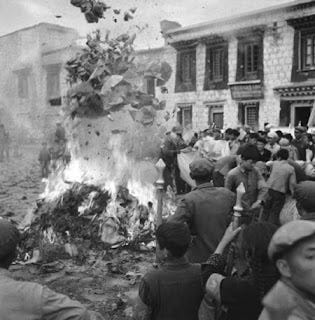Free Tibet (and the Olympics) !
On a recent scuba diving trip in the Red Sea, I witnessed a beautiful wonder of nature. I spotted a black-tip reef shark gliding over patches of giant purple brain coral. Upon closer inspection, I realized the shark wasn’t alone. Glued to its dorsal fin was a remora, a parasitic fish known to hover on the backs of larger fish and sharks, feeding on their leftovers and feces. The relationship is not symbiotic. The “host” gains nothing and is constantly annoyed, while the remora gets a free lunch.
I reported from Tibet in the fall of 2005. In Lhasa, I saw pictures and evidence of the destruction of thousands of Tibetan Buddhist monasteries by the Chinese government. I sensed the anxiety of a young women who snuck me into her secret shrine to the Dalai Lama, secured by a lock and key to prevent a Chinese spy from infiltrating it. Thankfully, many organizations have been created to restore the rights of Tibetans to practice their religion and express their unique cultural heritage. The Free Tibet movement has been around in fact since Mao’s Cultural Revolution trounced Tibet in 1951. Of course, the Tibet issue is one of many human rights violations by the Chinese government. The organization Human Rights in China (www.hrichina.org) does a great job of documenting these no-no’s in both English and Mandarin. Seizing the opportunity to gain free publicity, HRIChina has created a special 2008 Olympics awareness campaign. But does freeloading on the Olympic PR machine gets us any closer to the desired results of freeing Tibet. In the eyes of the world, aren’t these bandwagon Free Tibet protesters seen as the remora on the back of the Chinese dragon?
My feeling is that human rights violations are far more important than any single sporting event, and by attaching one's particular human rights issues to even the grandest of all sporting events, it effectively diminishes the perceived importance of this issue in the global psyche. In other words, the protests seem inextricably linked to these Olympics and are framed by the media in terms that are relative rather than absolute. Put yourself in the shoes of an average viewer who knows nothing about China’s human rights record. They’re thinking these protests wouldn’t be happening if it weren’t for the Olympics, so the human rights violations are a smaller issue, clearly being piggy backed on the greater issue, the Olympic games, and therefore these violations are viewed as lesser in significance.
I would also argue that in this case there is such a thing as negative publicity. The Olympics comes around once every four years and suddenly viewers are engulfed not with stories of athletes defying the odds to make it to Beijing, but images of angry protesters trying to extinguish the ultimate symbol of unity and tolerance, the Olympic torch. To decode this message is to see clearly that the media is demonizing the protesters and making the Chinese government seem like innocent victims.
Furthermore, what will happen once these Beijing Olympics are in the history books. Is the Tibetan autonomy struggle less important in 2009 than it is in 2008? These trendy, disruptive Olympic protests need to think outside the box to win this particular battle. Wouldn't it be better to raise money for an issue-specific advertising campaign to run alongside the Olympic Coca Cola commercials, creatively exhibiting the woes of the Tibetan people? Wouldn't an international education campaign highlighting China's human rights violations do more than attempting to extinguish the Olympic torch? Wouldn't a Chinese language anti-Dalai Lama vilification program do more to change the Buddhists image among Han Chinese than burning the Chinese flag? And what about the other persecuted ethnic groups in China such as the Muslim Uighurs who are concomitantly being driven off their oil rich land and persecuted for their religious beliefs? Is their cause not as important as the Tibetan cause or just not as sexy?
Sports have always been sacred to me. I loath cheaters, steroid users, match fixers, and anyone who messes with the sanctity of sports. The Olympic athletes who will compete this summer have trained their whole lives to perform on this stage. For many of them, it is the pinnacle of their careers and their lives. Their right to compete should be revered. But the sanctity of life and religious freedom should also be revered. Therefore, it is essential that the world find a different framework for condemning the Chinese for their share of human rights violations. It is too late to move the Olympics from Beijing. Had these voices been more organized and effective years ago, perhaps the Olympics would be somewhere else today. Instead of trying to extinguish the Olympic flame, I propose another idea. Why not create a monument with millions of flames for every Tibetan, Darfurian, and Uighur soul that has been affected by the Chinese government’s policies?

Buddhist books burnt outside of the Jokhang Temple, Lhasa, Tibet, early 1950's

Destruction of artifacts in the Jokhang Temple, Lhasa, Tibet, early 1950's
A video I produced with Adrian Baschuk for Current TV in November 2005.

